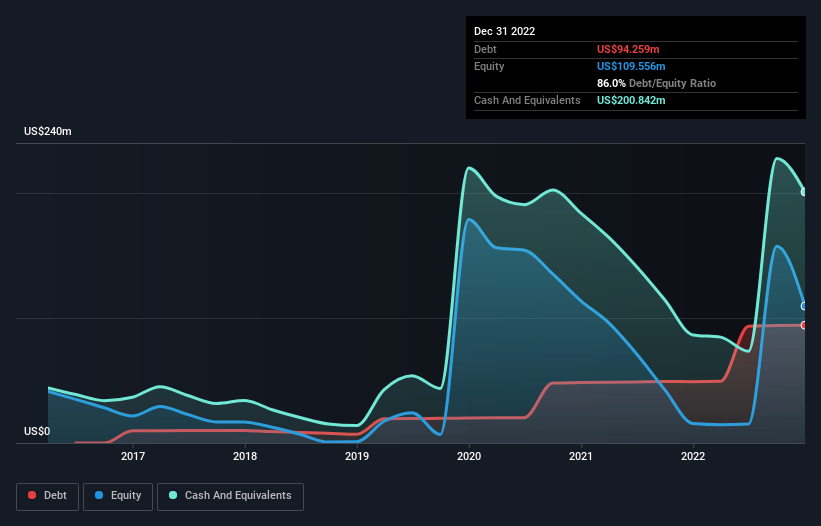
The external fund manager backed by Berkshire Hathaway's Charlie Munger, Li Lu, makes no bones about it when he says 'The biggest investment risk is not the volatility of prices, but whether you will suffer a permanent loss of capital.' It's only natural to consider a company's balance sheet when you examine how risky it is, since debt is often involved when a business collapses. We note that Axsome Therapeutics, Inc. (NASDAQ:AXSM) does have debt on its balance sheet. But the real question is whether this debt is making the company risky.
Why Does Debt Bring Risk?
Debt and other liabilities become risky for a business when it cannot easily fulfill those obligations, either with free cash flow or by raising capital at an attractive price. In the worst case scenario, a company can go bankrupt if it cannot pay its creditors. However, a more frequent (but still costly) occurrence is where a company must issue shares at bargain-basement prices, permanently diluting shareholders, just to shore up its balance sheet. By replacing dilution, though, debt can be an extremely good tool for businesses that need capital to invest in growth at high rates of return. When we think about a company's use of debt, we first look at cash and debt together.
Check out our latest analysis for Axsome Therapeutics
What Is Axsome Therapeutics's Net Debt?
The image below, which you can click on for greater detail, shows that at December 2022 Axsome Therapeutics had debt of US$94.3m, up from US$49.1m in one year. However, it does have US$200.8m in cash offsetting this, leading to net cash of US$106.6m.

A Look At Axsome Therapeutics' Liabilities
The latest balance sheet data shows that Axsome Therapeutics had liabilities of US$96.6m due within a year, and liabilities of US$125.4m falling due after that. Offsetting this, it had US$200.8m in cash and US$37.7m in receivables that were due within 12 months. So it actually has US$16.6m more liquid assets than total liabilities.
Having regard to Axsome Therapeutics' size, it seems that its liquid assets are well balanced with its total liabilities. So it's very unlikely that the US$2.97b company is short on cash, but still worth keeping an eye on the balance sheet. Simply put, the fact that Axsome Therapeutics has more cash than debt is arguably a good indication that it can manage its debt safely. When analysing debt levels, the balance sheet is the obvious place to start. But it is future earnings, more than anything, that will determine Axsome Therapeutics's ability to maintain a healthy balance sheet going forward. So if you're focused on the future you can check out this free report showing analyst profit forecasts.
In the last year Axsome Therapeutics managed to produce its first revenue as a listed company, but given the lack of profit, shareholders will no doubt be hoping to see some strong increases.
So How Risky Is Axsome Therapeutics?
By their very nature companies that are losing money are more risky than those with a long history of profitability. And the fact is that over the last twelve months Axsome Therapeutics lost money at the earnings before interest and tax (EBIT) line. And over the same period it saw negative free cash outflow of US$118m and booked a US$187m accounting loss. While this does make the company a bit risky, it's important to remember it has net cash of US$106.6m. That kitty means the company can keep spending for growth for at least two years, at current rates. Even though its balance sheet seems sufficiently liquid, debt always makes us a little nervous if a company doesn't produce free cash flow regularly. There's no doubt that we learn most about debt from the balance sheet. But ultimately, every company can contain risks that exist outside of the balance sheet. For example - Axsome Therapeutics has 1 warning sign we think you should be aware of.
If, after all that, you're more interested in a fast growing company with a rock-solid balance sheet, then check out our list of net cash growth stocks without delay.
New: Manage All Your Stock Portfolios in One Place
We've created the ultimate portfolio companion for stock investors, and it's free.
• Connect an unlimited number of Portfolios and see your total in one currency
• Be alerted to new Warning Signs or Risks via email or mobile
• Track the Fair Value of your stocks
Have feedback on this article? Concerned about the content? Get in touch with us directly. Alternatively, email editorial-team (at) simplywallst.com.
This article by Simply Wall St is general in nature. We provide commentary based on historical data and analyst forecasts only using an unbiased methodology and our articles are not intended to be financial advice. It does not constitute a recommendation to buy or sell any stock, and does not take account of your objectives, or your financial situation. We aim to bring you long-term focused analysis driven by fundamental data. Note that our analysis may not factor in the latest price-sensitive company announcements or qualitative material. Simply Wall St has no position in any stocks mentioned.
About NasdaqGM:AXSM
Axsome Therapeutics
A biopharmaceutical company, develops and delivers novel therapies for the management of central nervous system (CNS) disorders in the United States.
Exceptional growth potential with adequate balance sheet.
Similar Companies
Market Insights
Community Narratives


